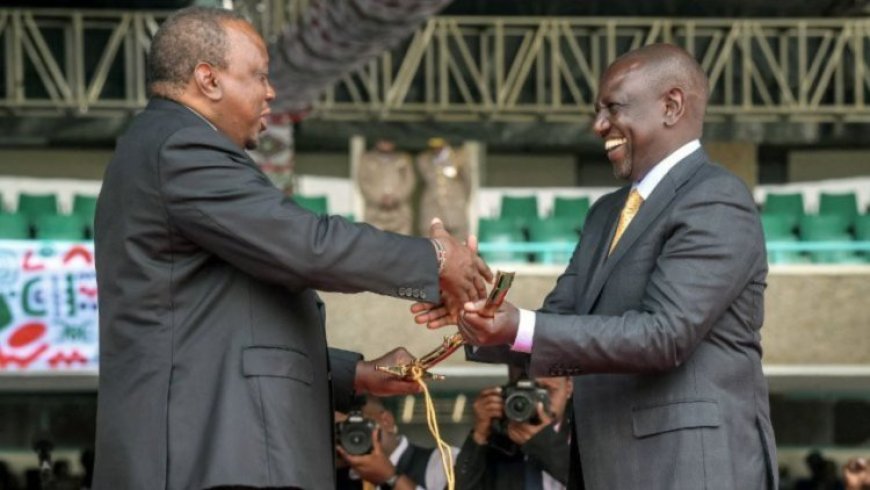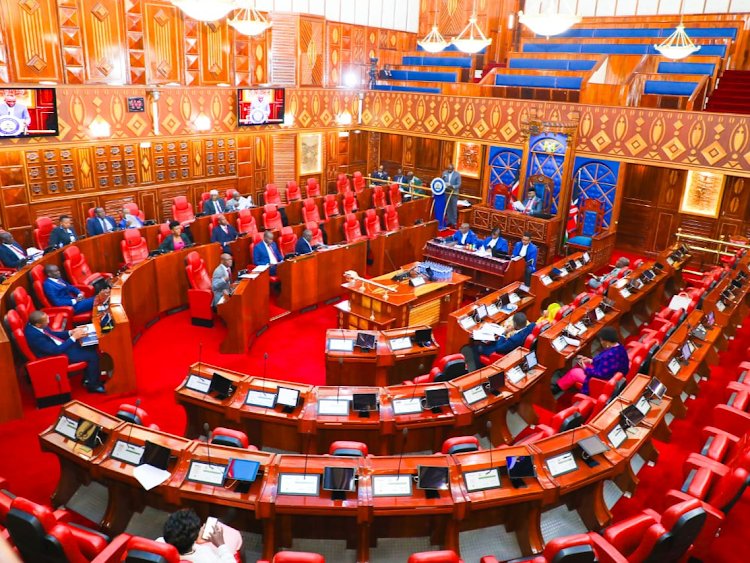Bill Seeking Extension Of Presidential Term Limit To Be Introduced In Senate
The Constitution of Kenya (Amendment) Bill, 2024 is set to be introduced in the Senate for the first reading, and it contains proposals that aim to increase the term limit for not just the President, but also for MPs, MCAs and governors.

Nandi Senator Samson Cherargei is refusing to give up in his push to have the presidential term limit in Kenya increased from the current five years, and has sponsored a new Bill to turn his proposal into a reality.
The Constitution of Kenya (Amendment) Bill, 2024 is set to be introduced in the Senate for the first reading, and it contains proposals that aim to increase the term limit for not just the President, but also for MPs, MCAs and governors.
“The Bill proposes to amend Article 136 of the Constitution, which provides for the election of the President, to increase the term of President from five years to seven years,” the Bill states in part.
President William Ruto's ally had on September 22, 2023, argued that five years might be insufficient for a president given the workload that is bestowed upon him or her in terms of service delivery to Kenyans as promised in the election manifesto and running of the government.

Nandi Senator Samson Cherargei. /THE STAR
Why It Matters
If the proposal contained in the Bill is actualised it then means that if one is elected president he or she would be in office for 7 years with the possibility of extension by another 7-year term.
Currently, Article 142 of the Kenyan 2010 Constitution indicates that: (1) The President shall hold office for a term beginning on the date on which the President was sworn in, and ending when the person next elected President in accordance with Article 136 (2) (a) is sworn in. The President, however, is prohibited from holding office for more than two five-year terms.
As of now, President Ruto is serving the first two years of his five-year term and is allowed to contest for another term in the 2027 general elections. However, if the Bill is passed before then, it would mean that should Ruto be re-elected in 2027, his second and final term would conclude in 2034.
Though one cannot rule out the possibility of amending the term limits of a Head of State, those fronting the proposal should know that it is a difficult process to have their wishes granted. The Constitution carries complex mechanisms for amending certain fundamental provisions, and the presidential term limit happens to be one of them.
What It Takes To Change Presidential Term Limit
As per a past report by The Conversation, one of the requirements is that the proposal would have to be approved by Kenyans in a referendum. Voters are unlikely to accept any efforts to interfere with what is a robust and effectively functioning constitutional system...why is that the case?
The purpose of term limits is to minimise corruption and abuse of office, open the government to new people and ideas, and infuse the government with more innovative and creative ways to solve national problems.
Term limits reinvigorate the country’s democracy and curb the potential for monopoly. They protect the democratic system from turning into a de facto dictatorship and prevent the incumbent from becoming a president-for-life.
Term limits are especially important in a country such as Kenya where most citizens still believe that an incumbent administration will favour the president’s ethnic group. They however do not discourage poor performance and the Constitution provides for other ways to deal with gross misconduct from a Head of State, including impeachment.
The Constitution thus sets the process for amending some of its provisions. For instance, changing the term limits of a President in Kenya requires:
- Securing the votes of two-thirds of both houses of parliament – the Senate and the National Assembly
- Securing the support of a simple majority of the citizens of Kenya voting in a referendum.
In November 2022, a UDA legislator triggered talks after he fronted a constitutional amendment to remove the presidential term limit. Fafi MP Salah Yakub proposed the removal of the term limit and instead replaced it with an age limit of 75 years. However, the proposal flopped.
Other Terms, Proposals In Consideration
The Bill is also seeking to amend Articles 101, 177 and 180 of the Constitution to extend the terms of MPs, senators, MCAs and governors to seven years from the current five.
The Bill also aims to create the office of the Prime Minister, similar to the proposals in the National Dialogue Committee (NADCO) and the Building Bridges Initiative (BBI) reports, and proposes that the President shall appoint the Prime Minister from among the Members of Parliament (MP). “The Prime Minister shall be the leader of the largest party or coalition of parties in Parliament,” the Bill states.
It further seeks to enhance the powers of the Senate by giving it the exclusive mandate to vet some state officers. “This Bill therefore seeks to increase the parliamentary role of the Senate by addressing the issues that have hampered the implementation of the constitution,” it reads.
The Senate has largely been seen as ‘an idle’ House with a limited mandate compared to the National Assembly. Specifically, the Bill is aiming to amend Articles 152, 156 157, 166, 215, 228, 229, 245 and 250 of the Constitution to assign the responsibility of approval for appointment of various state officers between the Senate and the National Assembly.

Inside the Kenyan Senate Chambers. /SENATE KENYA
The Senate, the Bill states, shall vet and approve for appointment Cabinet secretaries, the Attorney General, the Director of Public Prosecutions, the Chief Justice and judges. The House will also vet the chairperson of the Commission on Revenue Allocation, the Controller of Budget, the Auditor General, members of the Public Service Commission, the Inspector General of Police and members of constitutional commissions.
Currently, those state officers are vetted by the National Assembly.






